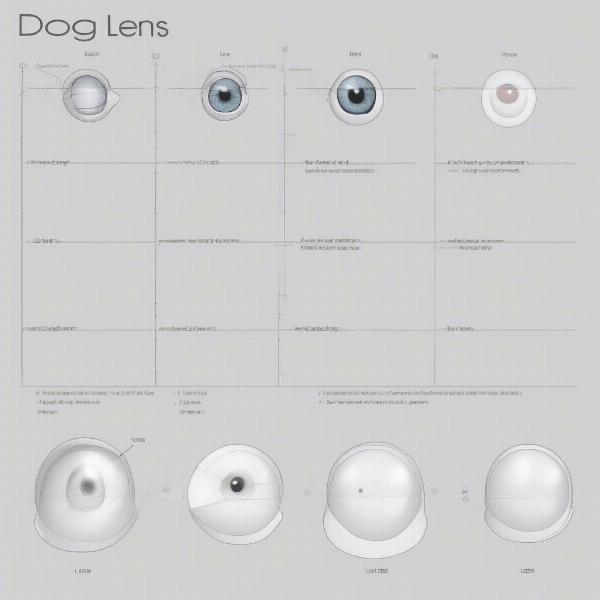Lens luxation in dogs is a serious eye condition where the lens, the transparent structure behind the pupil that helps focus light, shifts from its normal position. This can cause significant pain, vision impairment, and even blindness if left untreated. Understanding the causes, symptoms, and treatment options for lens luxation is crucial for any dog owner.
What Causes Lens Luxation in Dogs?
Lens luxation can be caused by a variety of factors, including genetics, trauma, and other eye diseases. Certain breeds, such as Terriers, Miniature Poodles, and Chinese Crested dogs, are predisposed to primary lens luxation, a hereditary form of the condition. Secondary lens luxation can occur as a complication of other eye problems like glaucoma or cataracts. Sometimes, trauma to the eye can also dislodge the lens.
 Diagram of Lens Luxation in a Dog's Eye
Diagram of Lens Luxation in a Dog's Eye
Recognizing the Symptoms of Lens Luxation
The symptoms of lens luxation can vary depending on the severity and direction of the displacement. Some common signs include:
- Redness and watering: The eye may appear red and irritated.
- Cloudiness: The eye may look cloudy or hazy.
- Pain: Your dog might squint, paw at their eye, or show other signs of discomfort.
- Vision changes: You may notice your dog bumping into things or having difficulty navigating.
- Dilated pupils: The pupil may appear larger than normal.
- Shaking head: Your dog might shake their head excessively due to discomfort.
Diagnosing and Treating Lens Luxation in Dogs
If you suspect your dog has lens luxation, it’s crucial to seek veterinary attention immediately. A veterinarian will perform a thorough eye exam, which may include checking the eye pressure and examining the lens position. Treatment options depend on the severity of the luxation and can range from medication to surgery.
Medical Management
In some cases, medications like eye drops can help manage pain and inflammation associated with lens luxation. However, medication alone will not reposition the lens.
Surgical Intervention
Surgery is often the recommended treatment for lens luxation, especially if the lens is completely dislocated or causing secondary glaucoma. The procedure typically involves removing the displaced lens.
What is the Prognosis for Dogs with Lens Luxation?
The prognosis for dogs with lens luxation varies depending on the severity of the condition and the presence of any complications. With prompt diagnosis and appropriate treatment, many dogs can regain comfortable vision. However, even after successful surgery, some dogs may experience some degree of vision impairment.
How Can I Prevent Lens Luxation in My Dog?
While primary lens luxation, the hereditary form, cannot be prevented, you can reduce the risk of secondary lens luxation by:
- Regular veterinary checkups: Early detection and treatment of eye diseases can prevent complications like lens luxation.
- Protecting your dog’s eyes from injury: Use appropriate eye protection for dogs participating in activities that could cause eye trauma.
- Choosing a reputable breeder: If you’re getting a puppy of a breed prone to lens luxation, choose a breeder who screens their dogs for the condition.
FAQs
- What breeds are most susceptible to lens luxation? Terriers, Miniature Poodles, and Chinese Crested dogs are among the breeds most commonly affected.
- Is lens luxation painful for dogs? Yes, lens luxation can be very painful, especially if it causes secondary glaucoma.
- Can lens luxation be cured? While medication can manage some symptoms, surgery is often necessary to correct the problem.
- What is the recovery time after lens luxation surgery? Recovery time varies, but most dogs require several weeks of restricted activity and close monitoring.
- Can dogs see after lens luxation surgery? Many dogs can regain functional vision after surgery, although some degree of impairment may remain.
- How much does lens luxation surgery cost? The cost of surgery varies depending on the complexity of the case and your location.
- What are the long-term implications of lens luxation? Even after successful treatment, regular eye checkups are essential to monitor for potential complications.
Related Articles on ILM Dog
About ILM Dog
ILM Dog (ilmdog.com) is your trusted global resource for expert advice on dog care and breeding. We provide practical, reliable information for dog owners of all experience levels, covering a wide range of topics from breed selection and health care to training, nutrition, and grooming. We are committed to helping you provide the best possible care for your canine companion. For expert advice on dog health, breeding, and other pet-related services, contact us at: [email protected] or +44 20-3965-8624.